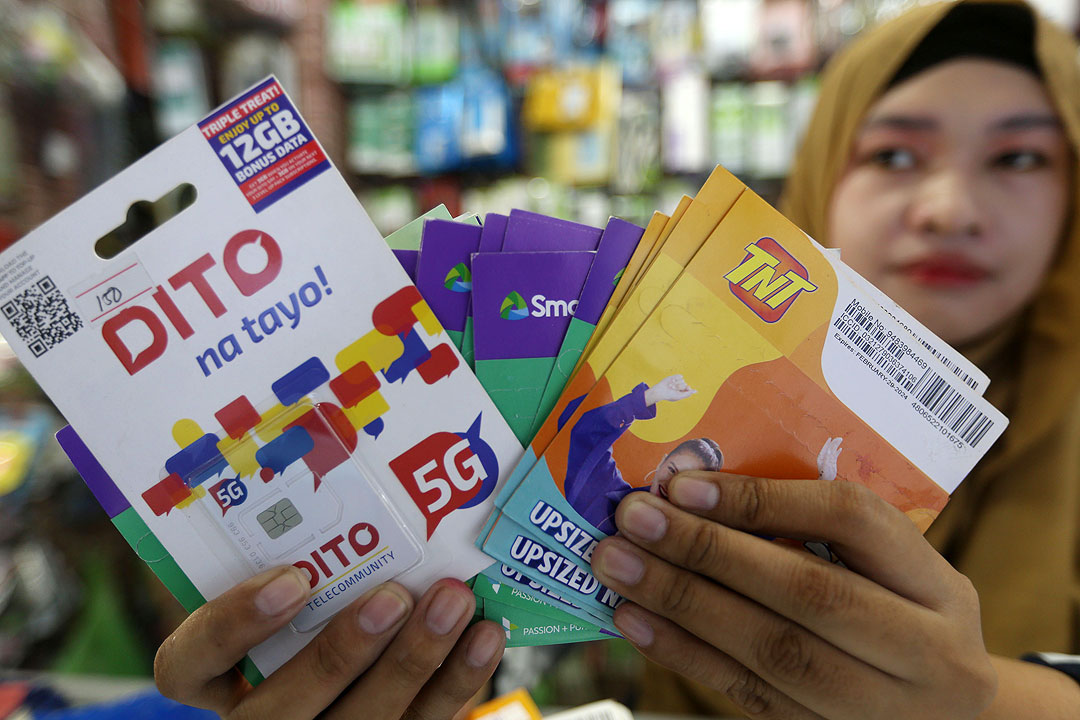SIM card registration seen to deter cybercrime

REGISTRATION PORTALS of the country’s three mobile network carriers Smart Communications, Inc., Globe Telecom, Inc., and DITO Telecommunity Corp. will go live today (Dec. 27), in line with the implementation of the new law that requires the registration of subscriber identity module (SIM) cards.
“The PTEs (public telecommunications entities) and their respective SIM registration systems have committed to make their systems up by (today),” National Telecommunications Commission (NTC) Deputy Commissioner Jon Paulo V. Salvahan said at a briefing in Quezon City on Monday.
Mr. Salvahan said there will be continual oversight and adjustment as the SIM registration processes are expected to evolve and adapt to any concerns that may crop up in the future.
The law, which took effect on Oct. 28, intends to regulate the use of SIMs by requiring users to register with mobile service providers as a prerequisite to activation. The implementing rules and regulations (IRR) were released on Dec. 12.
Under the IRR, mobile phone users should undertake registration of their own SIMs within 180 days — which may be extended by up to another 120 days — from the effectivity of the law.
Justice Secretary Jesus Crispin C. Remulla said at the briefing that the implementation of the SIM Registration Act will aid the fight against all forms of cybercrime.
He noted that it had been “very easy for anyone to use unregistered prepaid SIM cards to commit any cybercrime in the form of scams, harassment, libel, and smishing,” among others.
“In fact, our Office of Cybercrime has received a total of 4,899 reports of harassment or unlawful debt collection from online lending companies for the years 2020 up to December 2022, wherein the harassment was usually done through mobile phone calls and SMS,” Mr. Remulla said.
He also asked telcos to ensure the protection of their subscribers’ data.
“We do warn you (telcos)… that the success in the implementation of this law lies squarely on your shoulders and you have a duty to fulfill as well as a responsibility to the public who will be entrusting their data and information to you,” Mr. Remulla said.
“This government will be vigilant so that data in your SIM Registers are secured and protected at all times and shall comply with the minimum information security standards prescribed by the DICT (Department of Information and Communications Technology), consistent with internationally accepted cybersecurity standards and relevant laws, rules, and regulations,” he added.
The DICT is mandated to collect SIM card registries from the PTEs and maintain the records.
Under the IRR of the SIM Card Registration Act, anyone who provides false information or who uses fraudulent identification documents to register a SIM may face up to two years of imprisonment or a fine of not more than P300,000.
Mobile service companies that fail or refuse to register SIMs may also face fines of up to P1 million.
“We are ready to roll out our SIM registration processes after months of preparations, which have included, among others, studying best global practices and technology solutions from other countries that have already implemented SIM registration,” Francis E. Flores, senior vice-president and head of consumer business group-individual at PLDT Inc.’s Smart, said in a statement.
Globe Group President and Chief Executive Officer Ernest L. Cu said the company’s goal is to have a SIM registration process that is “seamless, secure, inclusive, and convenient for customers.”
DITO Chief Administrative Officer Adel A. Tamano said the company will do its best to make the registration process “as simple and painless as possible” for new and existing subscribers.
Meanwhile, the Department of Justice (DoJ) and the NTC said that separate legislation will be needed to cover smartphone applications, including Telegram, that do not require a SIM card, in order to further strengthen efforts against cybercrime.
“For those applications that do not need a SIM card, there might have to be another subsequent piece of legislation. They are not covered by the existing law as it is only for SIM registration,” NTC’s Mr. Salvahan told BusinessWorld.
DoJ’s Mr. Remulla said it is possible to block such applications in the country, but agreed that the legislation must be expanded.
“This is a gap that we need to fill,” he said.
Hastings Holdings, Inc., a unit of PLDT Beneficial Trust Fund subsidiary MediaQuest Holdings, Inc., has a majority stake in BusinessWorld through the Philippine Star Group, which it controls. — Arjay L. Balinbin
